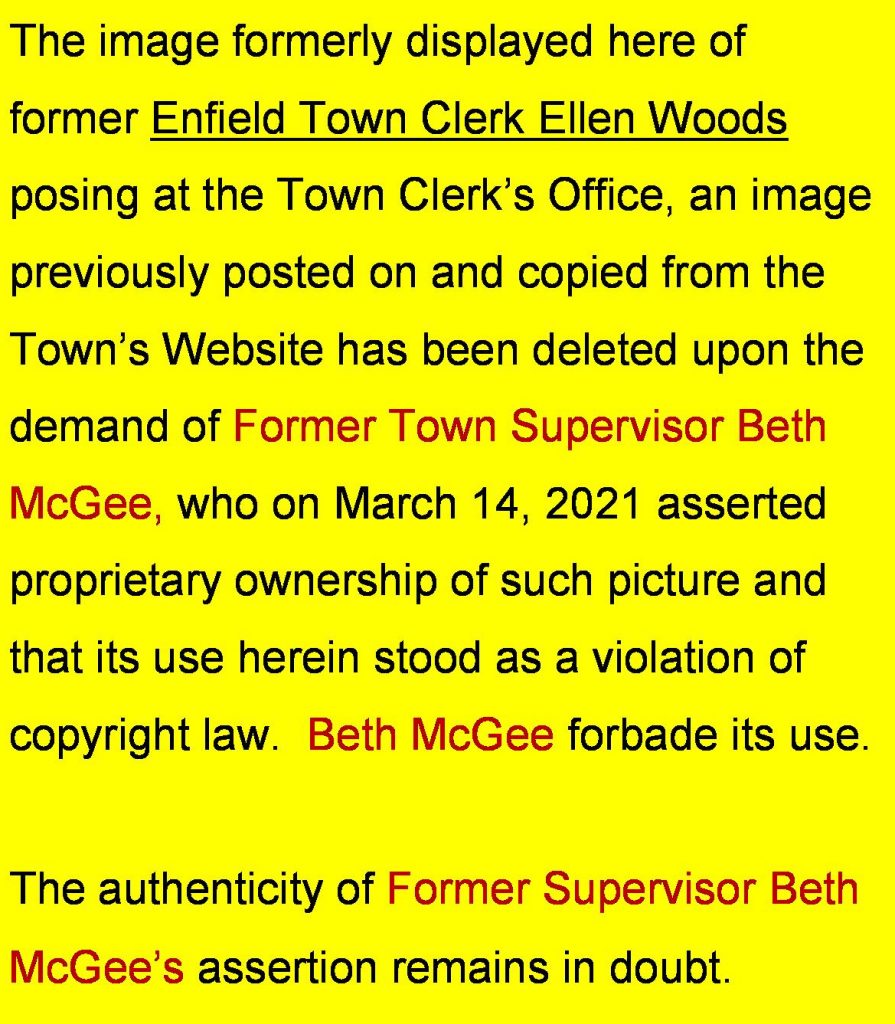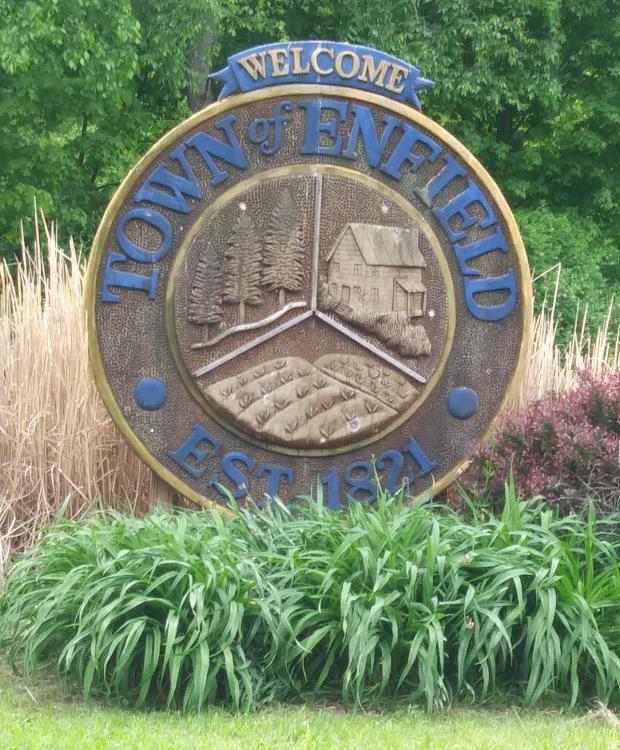Originally Posted August 15, 2020:
“When someone is cruel or acts like a bully, you don’t stoop to their level.
“No, our motto is: ‘When they go low; we go high….'”
Michelle Obama
Perhaps President Trump’s recent, much-maligned words to describe the coronavirus best apply at this moment to our Enfield Town Board. Yes, “It is what it is.” Moreover, the Councilperson who joins takes the Board as he finds it, not the Board he might otherwise want.

Sadly, in my view, our Enfield Board is dysfunctional. And for the good of our Town, a community and a people that I love, this dysfunction must end.
On issue after issue, our Enfield Board’s majority chooses polarization over the Four C’s of Service and Good Democracy: Character, Collegiality, Communication, and Compromise. A responsible governing Board must listen to its constituents; respond to their direction, their mandates; then meet its members in the middle to resolve differences and forge ahead for the common good.
Our Enfield Board does little of that. Rather, its governing majority charts its chosen agenda, listens to its constituents only minimally, then charges forth with a “Nanny Knows Best” governing style that games the system and plays to power rather than to the people. It happens issue after issue, month after month.
Divergent voices, including those of the Board’s minority, are marginalized, and worse yet, maligned. I’m a big boy. I have a thick skin. I can take it. And let me underscore this point: I wish my four professional women colleagues no ill will or disrespect. I seek to work with them, if only they will work with me, respect me, and understand that I seek only to advance the public’s agenda, not my own, as best I can discern it.
In my opinion, Wednesday, August 12th marked a low point. At our monthly meeting, we on this Board did not distinguish ourselves, at least not in any positive way. If I behaved out of line, spoke words I should not have, I apologize to you, my constituents. But in my opinion, others bear blame as well. And perhaps only future elections will fix the problem, cleanse the Democracy that Enfield deserves.
I will write much more about this problem during the weeks ahead. But for now, let me post my own analytical news account, an admitted condensation of what happened, for better or worse.
Peace.
Bob
Supervisor, Enfield Board argue over policy, personalities and power
Analysis by Robert Lynch, Enfield Councilperson, August 14, 2020
With tempers that matched the August heat, Supervisor Beth McGee and the Enfield Town Board Wednesday (Aug. 12th) sparred on issues ranging from Fire Company contract negotiations to budget policy to how much freedom the Supervisor and other officers should have in calling the Town’s lawyer.

In the end, the Board talked much, but acted little on the items in dispute. It was not the Board’s finest hour… make that three-and-a-half hours.
Example: Supervisor McGee spotted on the Agenda a motion Councilperson Robert Lynch (this writer) had sought to submit. She didn’t like it. Without asking members to weigh in, McGee took control:
“A Resolution for you and (Councilperson Stephanie Redmond) to meet with the Fire Company isn’t necessary. The Board is going to negotiate the (new fire) contract. The two of you are not.”
With Lynch, it struck a nerve:
“Beth, you are not the mayor of Enfield… You are not the County Executive of Enfield. I can put forward this Resolution and you can vote it down 4-1.”
The Supervisor stood down. Lynch read his Resolution, then argued it would help cure a “strategic negotiating imbalance,” one whereby Fire officials can structure their contract strategies in secret, but the Town must always lay its cards on an open table.
“I don’t feel comfortable with even having that authority myself,” responded Redmond, rejecting any newly-accorded power. Others agreed. Nobody seconded. Lynch’s motion died.
In each of the past two years, the Town has increased Fire Company spending by two per cent. Fire officials have said they expect at least another two per cent in any new contract next year. McGee said she couldn’t promise that much new money, yet still hoped next year’s Town budget would fall within the State’s (largely symbolic) property tax cap, a figure yet to be set. Lynch jumped in with his self-described “straight talk:”
“We’re not going to be able to stay within the tax cap this year. And I’ll stake my record on that one. We’re going to have a tough year coming up… a real tough year; and the taxpayers had better get used to it, because it wasn’t our fault. We didn’t bring this pandemic to Tompkins County or New York State. And we’re just going to have to suffer.”
“Wow. That wasn’t my perspective on this budget year at all,” responded McGee. The Supervisor sounded stunned, even though she’s told department heads to propose budgets that would either hold the line on spending or cut it by 12-20 per cent.
“Tough times lie ahead, tough times,” Lynch repeated.
“Well, all right. You heard it here folks,” McGee answered with a smile, perhaps surmising that Lynch had trapped himself politically. It was that kind of night.
****.
Despite this writer’ admitted reluctance, an otherwise-unanimous Board (Councilperson Mimi Mehaffey was excused) adopted a five-page policy for managing Enfield’s town website. Town Clerk Ellen Woods, who now administers that site, worried the policy might impose more unpaid work for her. McGee, meanwhile, insisted the policy has been in the works for at least two years and stressed a current need to keep the site non-political.

Town Clerk Woods’ web page picture to which Supervisor McGee objected, June 23, 2020
But on that latter point, Lynch questioned whether it was Woods’ picture on the Town Clerk’s web page, a photo since replaced, one whose graphic resembled the Clerk’s 2019 campaign mailer, that prompted the current rush to adoption. McGee had strongly complained about the graphic in earlier Town emails.
“You taught yourself how to manage the website?” McGee questioned Woods with seeming amazement. (The Supervisor claims to have built the site herself from the ground up.)

Clerk Woods’ current web page photo, August 14, 2020
“Of course, I did,” responded Woods. “Did we meet together in my office ever to discuss how to manage the website, because I don’t think so? Oh, tell me the training I received, Beth?”
“I don’t need to do this with you,” the Supervisor annoyingly retorted.
Lynch prefaced his own affirmative vote on an assurance that the new policy “will never be used as a political hammer by any person, present or future.”
****
Which brings us to the night’s hottest button pushed; a different policy, one seeking to restrict access to the Town’s legal counsel, Guy Krogh.
McGee and Lynch had offered conflicting drafts. In the end, neither won adoption; only argument, followed by an exhausted concession to delay action for another month.
McGee’s plan was briefer, just six short paragraphs. But her draft assured herself virtually unfettered access to Krogh’s services “as is necessary to complete the tasks relating to town legal matters.” All other officers, including the Town Clerk and Highway Superintendent, with whom McGee has frequently sparred, would either rely on free, outside counsel or appeal to the Town Board for a waiver.
Lynch, the Board member actually tasked with the policy’s drafting in July, put all Town Officers on a more level field.
“[T]his Policy recognizes the principle that all elected and appointed personnel within Enfield Town Government serve as a governing team, working together for the entire Town’s benefit, and therefore stand equally entitled to access qualified legal advice, as necessary, to perform their varied, publicly-assigned responsibilities in conformance with controlling law,” Lynch wrote as part of the 850-word draft’s “Guiding Philosophy.”
Additionally, under Lynch’s version, the Supervisor, herself, like other officers, could not stray beyond “his or her individual elected supervisory, administrative, or operational duties” in accessing counsel absent explicit Town Board consent.
“I prefer mine because mine is many, many less words and simpler to follow,” said McGee, defending her submission.
“My policy regards the Supervisor as one of equals,” countered Lynch. “The Town Highway Superintendent and the Town Clerk should not be second-class citizens or second-class administrators. The Town Supervisor should not have special authority that the other elected officials do not.”
To that, McGee rebutted: “The Town Supervisor does not have special authority. The Town Supervisor has special responsibility that other Board members do not have,” McGee perhaps missing the point that Lynch’s comparison was to other Town administrators, not to Board members.
“Robert’s policy does not address the issue that we’re having with larger conversations with the attorney that are causing larger bills,” Redmond interjected, the Councilperson opting to impose the Board as gatekeeper to everyone except the Supervisor in getting taxpayer-paid legal advice.
But logic soon yielded to emotion. What followed those civil exchanges was a 20-minute lecture—its tone falling somewhere between monologue and tirade—McGee’s strident assertiveness coupled with Redmond’s rapid-fire concurrence, each upbraiding Lynch and Highway Superintendent Barry (Buddy) Rollins, and alleging an “abdication of responsibility” that required the Board’s spending thousands in legal fees to shore up McGee’s and Redmond’s own preferred policies during the COVID crisis.
McGee to Lynch: “We signed off on a $4,000 legal bill (actually $2,722 for April) because your Highway Superintendent doesn’t know his job. And he created months of walking off the job and creating issues for his employees during a State of Emergency….”
McGee continuing: “It’s the Town Supervisor’s responsibility to be a steward for the fund of the Town. If you don’t know that that is the job of the Town Supervisor, I hope that you don’t run for the job…. This Board was so indecisive during that State of Emergency, someone had to get legal recommendations from the attorney.”
Lynch, in response: “If I ever serve as Town Supervisor, I will never act like a king…”
McGee: “You abdicate your responsibility on this Board all the time, Bob. So don’t you tell me what you will or will not do….”
Then, McGee (later): “You just showed up last February and decided all of a sudden you know everything about Enfield’s local government and you don’t.” [Note: This writer has lived in Enfield for 51 years, beginning one year after McGee was born.] “Your choice is that you just think everybody knows how to do their job and you just let it happen abdicates your responsibility to oversee that and understand where the money is going. It’s an embarrassment.”
Lynch (calmly, in response): “I don’t want to be a micromanager, and I never will be.”
McGee also faulted Superintendent Rollins for failing to attend Wednesday’s zoom meeting, asserting the Board had questions to ask.
“That’s totally unacceptable,” chimed in Councilperson Virginia Bryant.
“Maybe because he doesn’t like being belittled,” Lynch observed.
Join us next month. The Town Board meets September 9th. Advice: Wear body armor.
###
A Tale of Two Policies

As I have written, a major flash point of contention August 12th was our disagreement over two conflicting policy proposals which would limit contact between certain Enfield Town Officers and taxpayer-paid legal counsel. Without elaboration, let me present here the contrasting proposals.
First, Supervisor Beth McGee’s Policy resolution:
WHEREAS, the Town of Enfield contracts with an attorney for the purposes of counsel to the Town regarding legal matters, and;
WHEREAS, communication with and payment for services of the Town Attorney are at the discretion of the Enfield Town Board, and;
WHEREAS, the Town Supervisor tends to legal concerns for the town as a representative for the Town Board, therefore be it
RESOLVED, the Town Supervisor is authorized to communicate with the Town Attorney within the bounds of the amount budgeted as is necessary to complete the tasks relating to town legal matters, and;
RESOLVED, the Town Board may, from time to time, authorize another Town Board member to communicate directly with the Town Attorney upon agreement of the Board on specific issues at hand, and;
RESOLVED, all other parties, elected or appointed, may reach out to the Association of Towns, contingent upon continued membership thereof, for legal consult, or may appeal to the Town Board for legal consultation on specific issues as necessary.
****
Now, the alternative Policy Proposal that I, Councilperson Robert Lynch, drafted as the Town Board had in July instructed me to prepare:
Town of Enfield
Policy Regarding Authorization for Contact with the Attorney for the Town
Purpose and Guiding Philosophy:
1. The purpose of this Policy is to establish firm guidelines, consistent with New York State Law, under which elected or appointed Enfield Town Officials, or those within the Town’s employ, may contact and thereby seek legal advice from counsel that the Enfield Town Board has designated as the Attorney for the Town (the “Attorney”).
2. The Enfield Town Board bases this Policy on the principle that the Attorney for the Town serves the Town of Enfield as a single and entire unit of Government; and that the Attorney does not serve the interests of any one Town Officer, whether elected or serving in any other capacity. It is the Town Board’s directive, consistent with New York State Law, that the Attorney for the Town provides publicly-funded legal advice to the Town, not personal or politically-advantageous legal advice to any person or group, including, but not limited to, the Town Supervisor, the Town Clerk, the Town Highway Superintendent, or individual members of the Enfield Town Board.
3. Moreover, this Policy recognizes the principle that all elected and appointed personnel within Enfield Town Government serve as a governing team, working together for the entire Town’s benefit, and therefore stand equally entitled to access qualified legal advice, as necessary, to perform their varied, publicly-assigned responsibilities in conformance with controlling law.
Oversight and Authority:
4. The final authority in the authorization of access to, and the obtaining of legal advice from, the Attorney for the Town shall rest at all times with the Enfield Town Board. Additionally, in accordance with the relevant provisions of New York State Law, the Town Board shall hold the power to retain, replace, or discharge the Attorney for the Town at its discretion or to supplement that Attorney’s service with additional qualified legal counsel.
5. Aside from the limited authority accorded through Paragraph 7 of this Policy Statement, no elected, appointed, or otherwise employed Enfield Town Officer or employee may retain Town governmentally-compensated legal counsel without the Town Board’s explicit authorization. Town Officers or employees may, however, retain independent legal advice at their own personal expense. Said Town Officers or personnel are additionally permitted, indeed encouraged, to secure legal advice through the New York State Association of Towns (“AOT”), so long as the Town of Enfield remains a member in good standing with the AOT.
Permissible Contact:
6. The Enfield Town Board may, by a majority vote of its seated members, retain legal services from the designated Attorney for the Town at any time to any extent and for any public purpose whatsoever, said purposes defined and recognized under New York State Law.
7. Any elected Town Officer holding independent supervisory responsibility, including the Town Supervisor, the Highway Superintendent, the Town Clerk, or the Town Justice, may contact the Attorney for the Town at any time to seek answer to legal questions pertaining and restricted to his or her individual elected supervisory, administrative, or operational duties, responsibilities defined by State Law. Said Officers may NOT contact the Attorney for the Town to secure personal legal advice, or to seek advice clearly of a political or interdepartmental adversarial nature.
8. The Town Supervisor, the Highway Superintendent, or the Town Clerk may designate his or her individually-appointed deputy to act on that Officer’s behalf. Additionally, the Town Supervisor may designate one or more members of the Town Board to contact the Attorney for the Town on the Supervisor’s behalf.
9. Individual Town Board members, in general, apart from the Town Supervisor, are NOT authorized to contact the Attorney for the Town independently of the Board to secure legal advice, other than to clarify or gain improved knowledge of prior opinions and statements of the Attorney. However, the Town Board may authorize one or more of its members to contact the Attorney, said authorization expressed either informally, through clear Board majority consensus; or formally, by Board majority vote.
10. Upon request, the Town Board may, by majority vote, authorize any Town elected or appointed official or any Town employee to seek legal advice from the Attorney for the Town on requested matters of official business which may otherwise fall outside the authorization limits heretofore established.
11. Nothing in this Policy shall restrict or limit the Enfield Town Justice(s) from seeking legal advice through the New York State Office of Court Administration or through other offices under the jurisdiction of the New York State Judiciary on matters unique to the Town Justice’s responsibilities within the New York State Unified Court System.
Complaints and Appeals:
12. Any person, including, but not limited to, Town Officers, Town Board members, or members of the General Public, may bring to the Town Board’s attention, with sufficient specificity, complaints alleging violation of this Policy by any person, elected, appointed, or employed by the Town.
13. Upon receiving any such complaint, the Town Board shall promptly review the complaint, determine its validity, and undertake appropriate corrective or disciplinary action. The affected Town Officer or employee may address the Board to defend his or her action. The Town Board’s decision shall be final, with no further provision for appeal.
****
Please, you, the constituents of Enfield, help select for us the better policy, the better path.
Bob

